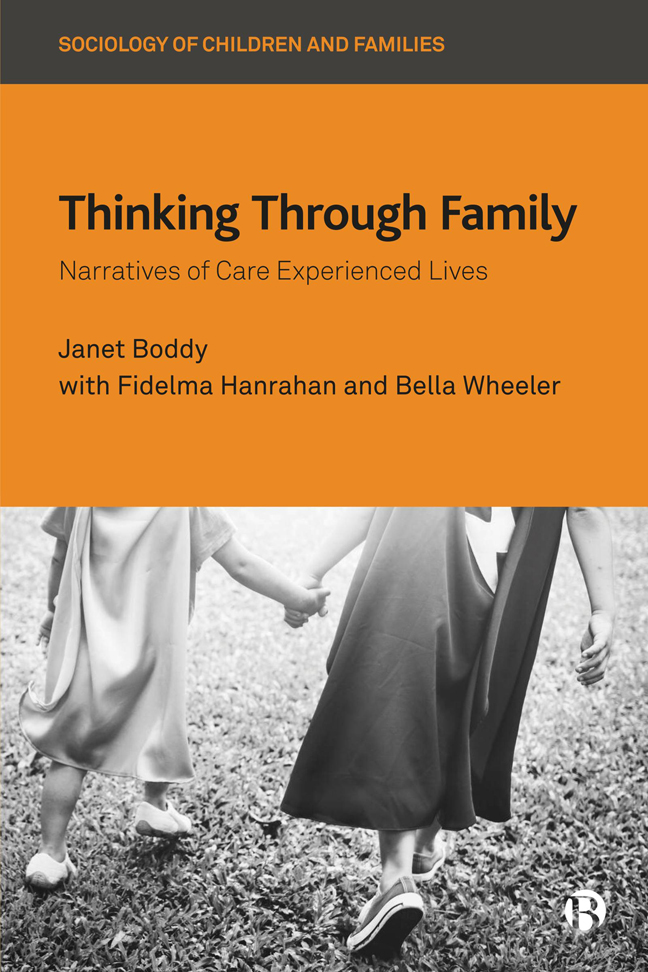Book contents
- Frontmatter
- Sensitive Content in this Book
- Dedication
- Miscellaneous Frontmatter
- Contents
- List of Figures and Table
- Acknowledgements
- 1 Why Think Through ‘Family’?
- 2 Learning From Care Experienced Perspectives
- 3 Doing Family: The Significance of the ‘Ordinary’
- 4 Re/Configuring Boundaries: Who Counts as ‘Family’?
- 5 ‘How Can We Not Talk about Family When Family's All That We’ve Got?’: Care and Connectedness
- 6 Understandings and Experiences of Parenthood
- 7 Thinking Through Family: Implications for Theory and Practice
- Notes
- References
- Index
7 - Thinking Through Family: Implications for Theory and Practice
Published online by Cambridge University Press: 24 January 2024
- Frontmatter
- Sensitive Content in this Book
- Dedication
- Miscellaneous Frontmatter
- Contents
- List of Figures and Table
- Acknowledgements
- 1 Why Think Through ‘Family’?
- 2 Learning From Care Experienced Perspectives
- 3 Doing Family: The Significance of the ‘Ordinary’
- 4 Re/Configuring Boundaries: Who Counts as ‘Family’?
- 5 ‘How Can We Not Talk about Family When Family's All That We’ve Got?’: Care and Connectedness
- 6 Understandings and Experiences of Parenthood
- 7 Thinking Through Family: Implications for Theory and Practice
- Notes
- References
- Index
Summary
Attempts to fathom the depths of life by examining our flesh and blood create new imperatives for the state.
Sue White and David Wastell, Families, Relationships and Societies, 2017, p 441Why ‘thinking through family’?
This is a book about family, based on the narratives of 35 young adults with care experience. These individuals are not typical, or statistically representative, of care experienced adults in England. They took part in one of two studies, which were very different in focus: Against All Odds? was a cross-national project focused on people who were in education or employment at the time of joining the research; the Evaluation of Pause examined the work of a programme of intensive support for women in England who had been identified as being at risk of recurrent child removal. This book is focused on the experiences of two subgroups within those studies: Against All Odds? participants who were living in England, and participants in the Evaluation of Pause who were part of a ‘care leaver pilot’. The population of people with care experience is diverse and, inevitably, there are striking similarities and differences in people's experiences within and between the two studies. But my aim in bringing the studies together was not to compare, nor have I tried to identify pathways to risk or protective factors. Rather, the purpose has been to illuminate the diversity of experiences and narratives of family for people with care experience, and to enable the recognition of care experienced lives as varied, specific and socially and biographically located, avoiding the dangers of a deficit-focused ‘single story’ of the care experienced family. The overarching objective of the book has been to think through family in the lives of care experienced people, in order to:
• extend the theorization and conceptualization of ‘family’, challenging the politicized binary of the ‘ordinary’ and the troubled ‘other’;
• inform family-minded approaches to policy and practice that respond to the enduring dynamic complexities of family relationships for young people, during childhood and into adult lives.
Conceptualizing family: thinking beyond the ‘single story’
I began this book by discussing the dangers of a ‘single story’ of family, borrowing the metaphor from Adichie's (2009) discussion of the Igbo concept of nkali, meaning ‘to be greater than another’.
- Type
- Chapter
- Information
- Thinking through FamilyNarratives of Care Experienced Lives, pp. 152 - 166Publisher: Bristol University PressPrint publication year: 2023

